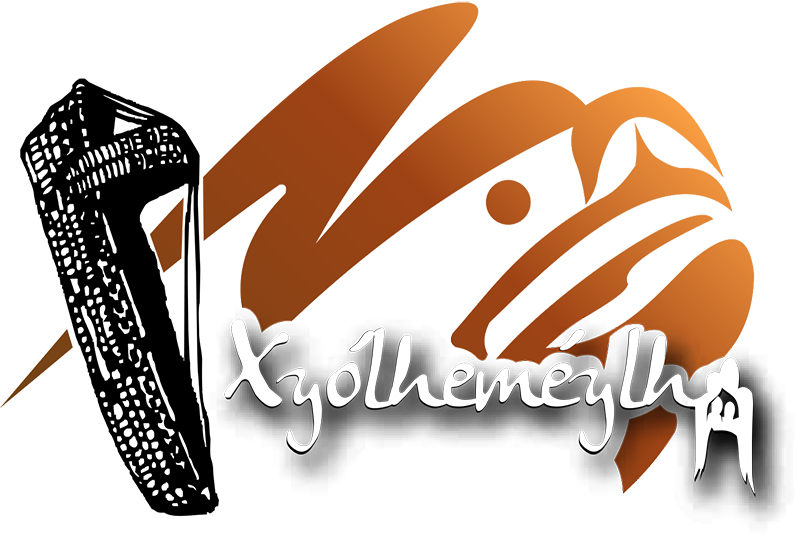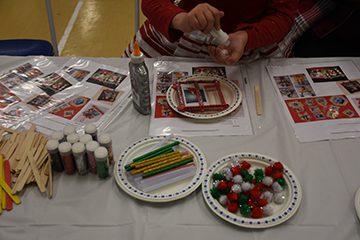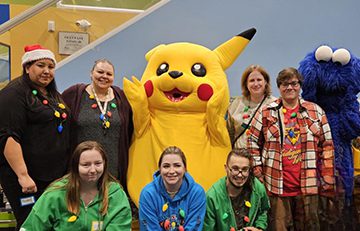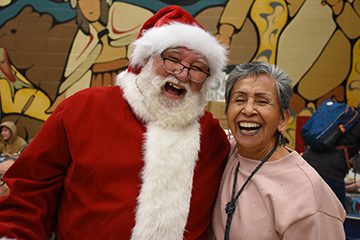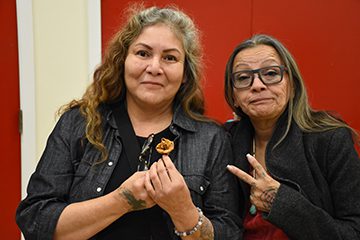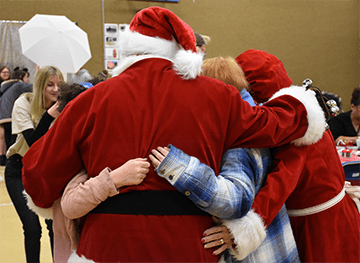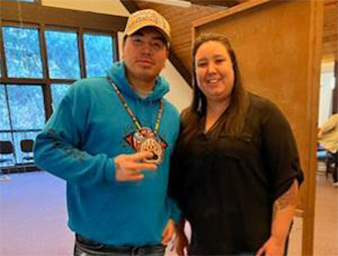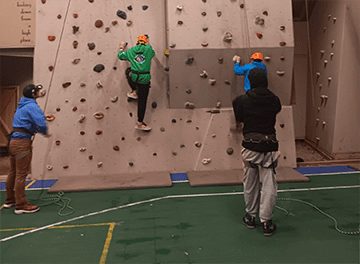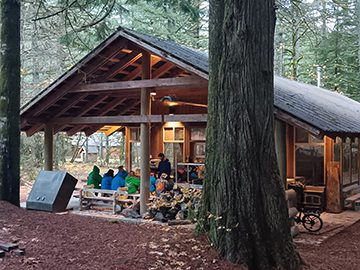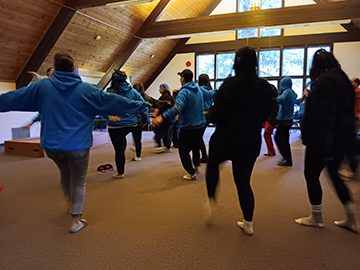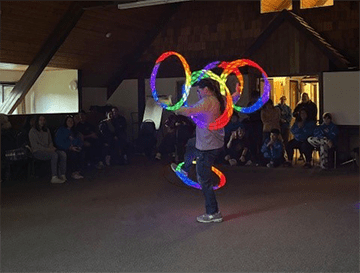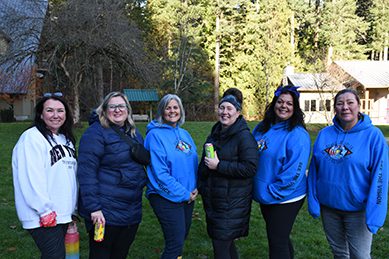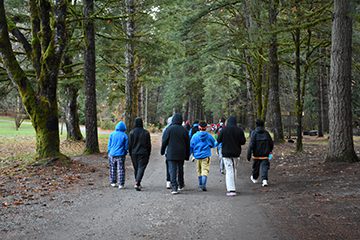Message from the board of directors
Fraser Valley Aboriginal Children & Family Services Society
Sqwélqwel - Xyólheméylh Winter 2024 Newsletter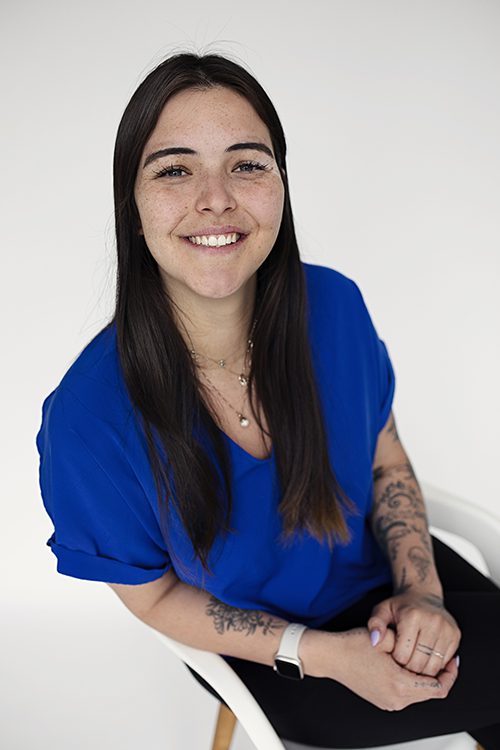
Board President Jade Victor
Xyólheméylh Board of Directors President’s Message
Ey Swayel – Good day! Welcome to our Winter Newsletter. We have had some recent changes to the Board since the AGM in November. Angelina Bowen and Doug Kelly have resigned. Their seats are being filled by Marcella Pruden and Marion Mussell who were both on the ballot at the last AGM. They will hold their seats until the next AGM when the positions will be up for election again for a three-year term.
We also chose a new executive for the Board. I am excited to serve as the new President, taking over from Jennifer Janik. I thank Jennifer for her service and for the smooth transition. Also appointed to the board are Joshua Bailey as Vice President; Glenda Campbell as Treasurer; and Latasia Commodore as Secretary. The Board also includes members Tammy Bartz, Phil Hall, as well as Marcella and Marion as mentioned in the previous paragraph.
On the subject of our AGM, we promised that all questions that came up would be answered in this newsletter. You can read the questions and answers directly below. We thank everyone who came out, showed interest and asked questions.
We have been busy reviewing Xyólheméylh’s strategic goals. We believe that our new goals are streamlined and simplified and more accurately delineate the operational goals vs. the governance goals.
New Operational Goals:
#1 Support closing the socio-economic gap for Indigenous families and communities.
#2 Ensure adequate, feasible, and long-term organizational facilities.
#3 Ensure agency practice adheres to standard and exceeds community needs.
#4 Ensure a culturally aware workplace.
#5 Cultivate an organizational framework that is supported and sustainable.
New Governance Goals:
Overarching statement: Weaving the work of the Board around Indigenous cultures to achieve the following goals:
#1 Continue to practice good Governance.
#2 Maintain accountability of the ELT through building relationships and collaboration.
#3 Strengthen Board visibility and relations throughout Xyólheméylh and communities.
We look forward to a new year and working with our old and new members of the Board.
Temqethelmot - Jade Victor
Questions from Society Members: November 14, 2023 AGM
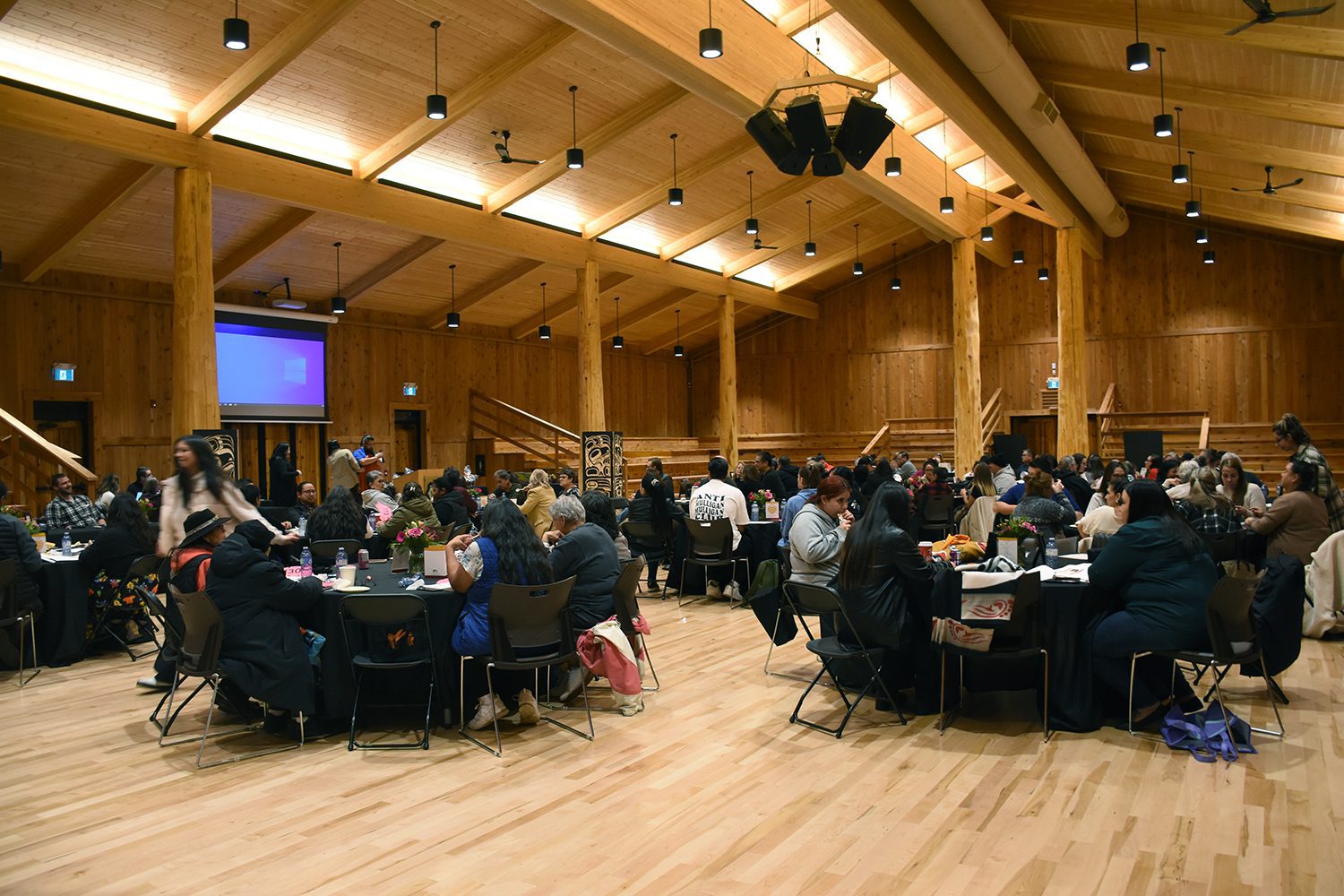
Orange font indicates an answer from the Board of Directors. Blue font indicates an answer from our Executive Leadership Team.
#1 (Anonymous)
Question for the Board:
- In what capacity does the BOD require ongoing consultation from their contracted employee, Matt?
- Will the BOD require this consultation as they proceed?
- What effort has been made to find an Indigenous contractor?
Answer: Many people do not understand the nature of Board work, and especially with the Agency, as ultimately, we are responsible for whatever happens. Matt holds years of historical knowledge, which is invaluable, and he has been instrumental in keeping us on track and insuring we do our job to the best of our ability. Re-structuring the organization after Samantha left was a huge undertaking that took a year, and again, he was an integral part of that work.
#2 (Anonymous)
Question for the Board:
- What initiatives do you as the Board have in place to have more Indigenous representation in upper-level management positions?
- Who have the education, experience, knowledge, and wisdom and who are more than qualified.
Answer: We always look for Indigenous people to fill the upper-level management positions; however, ethically and responsibly, we need the best person for the job, no matter the colour of their skin. Additionally, most of our Indigenous people who have the skills and knowledge are currently employed elsewhere, as the need is great throughout the province.
Question for Operations:
- What is the ELT doing to try and create staff retention?
Answer: Providing training and support to staff, so that they are confident in doing their jobs. Following the Indigenous Services agreement and providing retention bonus at year end.
We have surveyed staff to ensure we are learning about what is most important to them. Our intent is to continue this engagement process and make changes based on the feedback that we have just received.
- What is ELT, DOOs, doing to ensure all new staff are trained and monitored to do the work in a good way with out children and families?
Answer: Reviewing our onboarding and mentoring process for new staff. We are ensuring that all staff take cultural training after they are hired. In this past year, we have also been engaged in a collaboration to develop a new training curriculum focused on practically putting learnings regarding historical impacts into practice.
Ensuring check-ins with new staff to ensure they are getting the support needed. Individual and group supervision to support staff.
#3 (Kelowa Edel)
Question for the Board:
- What is the role of the name holder “Xyólheméylh” and how can they guide the Vision of the name in its truest meaning with the Board and Operations?
Answer: I think that’s a question for the Elders who created the roles and the name holders.
Question for Operations:
- Is there a different way of doing business?
- We’ve been stuck in a rut for 30 years and the organization continues to work in a vacuum (alone). When there are many partners waiting to support and collaborate with you. We are next door and want to work together in support.
Answer: We are currently focusing on looking at other community partners to support and collaborate with.
One of our goals this year is to develop relationships with all of our community partners so that the children and families we collectively serve have the best wrap around services possible. We look forward to working with you!
#4 (Louse Kaarsmaker)
Question for the Board:
- Why can’t we just address our questions without writing them out?
Answer: It is difficult to address questions at an AGM, when the agenda is already packed, and there are important issues, such as voting that need to be dealt with, as well as updating all members on the work done in the previous year.
#5 (Lorelei Roberts)
Question for the Board:
- Are there any plans to fill the cultural advisor to management & TL role that Pat Charlie, Rene Green, & Helen Joe had?
We are very grateful to have had the privilege as an organization to have learned from these Matriarchs. We are still benefiting from their teachings today.
We also currently have a vibrant Elder’s advisory council of up to 20 elders at any given time and we are reinvigorating our cultural committee with Stó:lō Elder membership to ensure that Culture is lifted up within our organization.
- Is there a plan to work toward filing management, TL positions with Indigenous workers or cultural integration into the practice again?
Yes more Indigenous workers is always our hope with paneling for new positions and cultural integration into practice is strongly encouraged by staff who have the teachings and hold the cultural rights to practice those.
- What is the plan to rebuild our Agency’s respect in our communities?
Answer: I believe these are actually questions for operations, the Board does not hire anyone other than the three EDs.
Question for Operations:
- When will we get our building to staff everyone again?
Answer: There is a 5 year plan to try and have our own building.
- What is the plan to rebuild Xyólheméylh respect in our communities?
- Will there be a plan to hold an Elder’s Advisory Cultural Advisory for workers to reach out to for guidance/direction for family search and connections in Xyólheméylh's practice? Some Edlers have extremely valuable family connection knowledge to share with workers.
Our Elder’s advisory is available for this and welcomes these consultations. Sasha Ratsoy is our Elder’s TL and takes referrals on a regular basis to support the connection with Elders who could help in each worker’s specific request.
#6 (Alice McKay)
Question for the Board:
- Why is there not time to address questions in the meeting?
Answer: It is difficult to address questions at an AGM, when the agenda is already packed, and there are important issues, such as voting that need to be dealt with, as well as updating all members on the work done in the previous year.
- When do we ever get a chance to address Elder’s Advisory to see how they feel about Board & Operations. Is there time to meet with them?
Answer: The Elder’s Advisory comes under operations, it is not for the Board to determine when or who they can meet.
Our Elder’s advisory is involved in many of our operations and their role is to be a cultural support to the work of the staff for the benefit of community and children and families. They also work directly with children and families at times.
If you would like to include an Elder in our meetings with your community we would be happy to accommodate this request.
#7 (Anonymous)
Operations:
- How do you advertise these workshops? Too many youth are missing out in our communities because we don’t know.
Answer: All our workshops are shared with all staff internally. We share with our communities as well and post upcoming workshops and registration information on social media including our facebook site.
#8 (Anonymous)
Question for the Board:
- When will central offices be in one office building?
Answer: There is a 5-year plan to try and have our own building.
- With Sts’Ailes-Seabird obtaining jurisdiction, how does that affect services provided by Xyólheméylh? MOU?
Answer: We have a committee that is currently working on this with the collaboration of Laura-Dawn and lawyers and consultants.
We are also actively collaborating with Seabird to develop an MOU and would welcome an opportunity to do the same with Sts’Ailes as well.
Question for Operations:
- When will central offices be in one office building?
- Who’s initiative is supported caregiver network? MCFD or Xyólheméylh?
- Why haven’t (?) protocols been developed by Sts’Ailes & Seabird?
Answer A: There is a 5-year plan to try and have our own building.
Answer B: The supported caregiver network is a Xyólheméylh initiative, in partnership with MCFD.
Answer C: We are meeting regularly with the communities to strengthen our working relationships.
#9 (Anonymous)
Question for the Board:
- Can the agency allocate additional funds for prevention and programs dedicated to prevention?
- Ex. Cultural programs open to urban families.
- Ex. Hiring an Urban Community Engagement Worker
- Ex. More programs open to youth before coming into care.
Answer: The problem is there is very little prevention funding for off-reserve, as that funding comes from the province and not from ISC. We do the best we can, but there is never enough money. With Bands receiving their prevention funding, it would be great if they could include their off-reserve people.
Question for Operations:
- The new Youth age out/transition team has a high number of cases. Will it have enough staff for that team? We heard 2 staff for over 100 cases?
Answer: The new team has a Team Leader and four staff. As cases transfer to the team we will be able to assess the need for and advocate for additional staff.
#10 (Paula Olmstead)
Board:
- Thanks for all your hard work, was a great learning experience to have a seat on the Board. Good luck with this next year ahead.
Question for Operations:
- Thank you for all the hard work, dedication, and time away from family. Your expertise and knowledge is very appreciated. Keep doing what you do. Changing life patterns to families in need is a difficult thing but our future generation need your guiding light.
#11 (Dianne Garner)
Question for Board & Operations:
- If there are evacuations of Stó:lō homes & foster homes, what is the communication plan?
Answer: Each reserve community has their own emergency management plans that they would follow. The foster homes off-reserve would be following the emergency plans of the local city.
Message from executive Leadership team

Ey Swayel!
Welcome to our Winter Newsletter.
We start our sharing in this season by stating again that we are pleased with the Supreme Court’s decision to uphold Indigenous Peoples’ authority over their children.
Since C-92 became law, we have been working with the Stó:lō Communities on decolonizing child welfare and making the legislation a reality. We recognize that there is still much work to be done and value our partnerships on this journey. We look forward to continuing to work together to ensure that children remain with their families when possible, that children are safe and surrounded by their community, and that families are strong.
This season we have continued to focus our work on cultural services to support wellness and resiliency.
In this newsletter, we would like to tell you about one of our innovative programs – our 12-week Wellness programs for women and men.
This program is geared toward Indigenous families that are experiencing the intergenerational impacts of colonization and residential schools. Namely, families who are struggling with intimate partner violence, attachment issues, communication issues, cultural genocide, and community detachment. This program is unique in that it has been designed to amalgamate psycho educational skill building with traditional ways of healing.
The goal of this program is to provide a safe space for reflecting on behaviors and develop alternative skills within relationships and provide an avenue to introduce (or re-introduce) traditional ways of healing and resiliency; and to provide connection to local communities and cultural teachings. Another goal is to create a community of support through peer relationships.
We have had four groups each of men and women graduate from the program so far and we have received so much positive feedback from the women and men that have participated. They have told us they enjoy the feeling of family they develop with the other participants and the support of the Elders.
We will continue to offer the program throughout the year. While this is a Xyólheméylh staff and Elder’s program, we send the United Church’s Healing Fund a big thank you for their financial support. We also want to thank our staff on the Family Strengthening Team. The program was led by Family Strengthening Counsellor Lisa McCoy, with support from Team Lead Patrick Martin. We also want to thank Kaelin Horne, Ross Hyde, Chelsea Ferraro along with Elders Desta Branham, Darlene Tommy, Allan Mason, Greg Poitras, Eddie Julian and the late Gil Poitras.
The Wellness Groups are just one example of the great work in prevention that Xyólheméylh staff are carrying out with heart and culture at the center!
This season we have also been reflecting on the gravity of the challenges that many of our families face. In the months to come, we will be turning our attention to increasing our partnerships with like-minded organizations so that we can work together to ensure everyone we work with has a full circle of support.
ELT – Rhea Del Vecchio, Rod Spitzig and Laura-Dawn Wilkin
Meet a Caregiver: Brenda Wiens
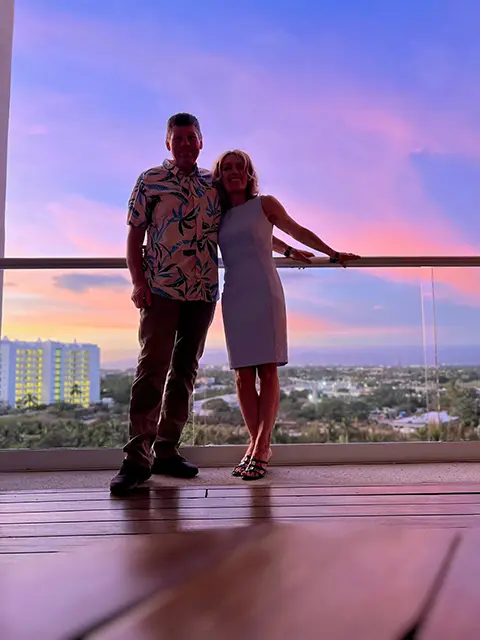
Brenda Wiens, along with her husband Gord, has been a caregiver, off and on, for 23 years. She didn’t set out to be a caregiver, but that became her trajectory. “I had a licensed daycare for about seven years, when out of the blue a social worker called and asked if I could take in a sibling group temporarily. Then she took in a second sibling group and the “temporary” situation became years. She eventually closed the daycare but kept the sibling groups. “I see something in those kids that I don’t see in other kids … a sense of resourcefulness. Everyday I’m amazed these kids get up and face the day,” says Brenda.
In 2012 she and Gord became caregivers for Xyólheméylh and have consistently had five to nine children and youth at any given time in their care. Currently she has six kids in her care, ranging in age from 17 to nine years. She also has two bio kids who are now adults and she recently became a grandmother. Brenda says her bio kids benefited growing up with other kids in their family and over the years have developed close relationships with some of the foster kids.
Brenda estimates that over 80 per cent of the kids that have been placed with her and Gord have returned to their families. And they often stay in touch - one of those children is going to be competing in the Paris Olympics this summer on the Canadian rugby team. “She’s an incredible girl,” says Brenda, clearly proud of her former foster daughter.
All but one of the children currently in Brenda’s care have connections and good relationships with their bio families. This past Christmas was a busy time with the bio families visiting the children. One of the kids spends two weeks every summer with his grandparents in the interior. Brenda also makes sure to expose the kids to their Indigenous culture by taking them to Xyólheméylh events, such as the Children’s Christmas Party and the Visions and Voices Forum. “I always make sure I’m taking them to events and ceremonies, and two of the girls are Métis, so they have their separate events. We make sure they’re also signed up at school for Indigenous supports,” says Brenda.
Brenda has training in intercultural studies and has always had an appreciation for different cultures. In her twenties she lived in the Phillipines for five years. “Different cultures have always been a part of me,” says Brenda.
Brenda says learning how to parent has always been a learning curve. She says that she’s especially learning how to be an advocate for youth and becoming more tolerant and understanding of difficult youth behaviour. “I like challenges, so I’m trying to reframe my thinking about youth and build attachment wherever I can. I can’t change them or judge them. I just have to give them love and communicate trust. That’s all I can do.”
“Mostly I just love kids, that’s basically what it comes down to,” says Brenda. “I do this because I care about kids.”
Brenda and other caregivers make a huge difference, offering safe and loving homes. We lift our hands to Brenda and all the Xyólheméylh caregivers. If you are interested in becoming a caregiver we have info sessions the second Wednesday of the month at 6:30 pm and the third Tuesday of the month at noon. Contact Norma Commodore at: [email protected] to register.
New feature: Si:yólexwe teachings
Meet an elder: maria reed (Waabigekek Ikwe)
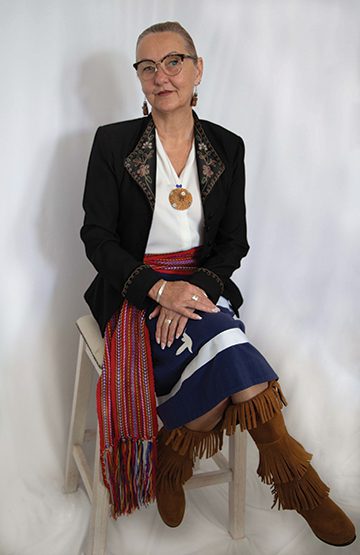
When Maria was a child she had a recurring dream that she was being chased on horseback by “wild Indians.” Back then, she didn’t know she was Indigenous, but now that she knows, the dream makes sense symbolically.
Like so many Indigenous people, her parents and grandparents were robbed of their heritage in residential schools and were fearful of discrimination, so they didn’t practice their culture.
Like the dream she had as a child however, Maria’s Indigeous background would eventually catch up to her in her teens when one of her aunts discovered the family’s Indigenous roots.
Maria hasn’t looked back since, immersing herself in the culture. Her great grandmother was from the Batchewana First Nation in Ontario and her great grandfather was French and Metis.
Maria is French, Cree and Ojibeway on her father’s side and Swedish Sami on her mother’s side. The Sami are Sweden’s Indigenous people and known as Reindeer Herders.
Since finding out about her Indigenous roots in her teens, Maria has immersed herself in learning about her culture. “When I found out it was one of those ah ah moments,” says Maria. Her Indigenous name, Waabigekek Ikwe, means White Hawk Woman
Maria loves being an Elder and feels that everything she has done in the fields of wellness - body, mind and spirit, has come together to prepare her to be an Elder.
Early on Maria took a course on Indigenous culture that exposed her to sweats, smudging, circles and healing practices. Maria has worked as Life Skills Coach, a Human Relations Councillor and spent years working with Fraser Valley Aboriginal Health Council on health and wellness initiatives and as an Elder with Circle 5. “I learned a lot about human nature and a lot about myself,” says Maria.
She credits her greatest learnings to fellow Elders. “You learn about all the different cultural practices. The more teachings you learn, the more you find out about human nature,” says Maria. “In our business we work with people and the more you can understand where they come from, the better you can work with them,” says Maria.
Maria says she is not much of a person for hobbies. “I love what I do,” says Maria, who prefers to spend her time working or spending time with her two daughters and grandchildren. She says she loves challenges, creating well working systems and helping people. She is a problem-solver by nature. She is also a life-long learner and is currently taking a course on death and grieving.
Maria believes Elders set the tone and bring culture and wisdom. She urges staff to reach out to the Elders, to build relationships.
She believes the Indigenous world view of everything being connected is essential to the work of the Agency. “No one is better than anyone or anything else,” says Maria
Medicine Teachings with the Elders: Stinging Nettle and Horsetail
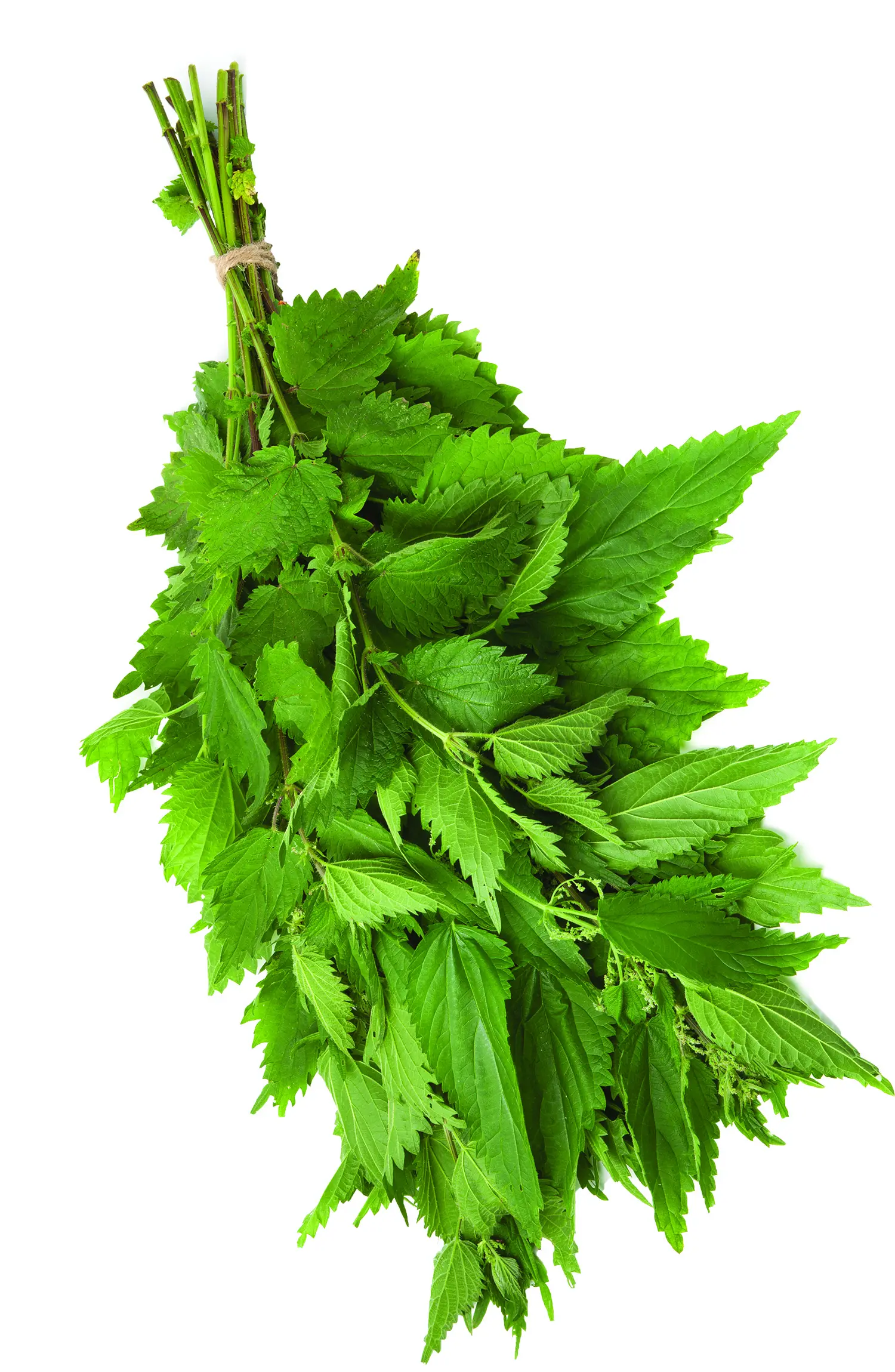
Stinging Nettle
Stinging Nettle is a diuretic and is great for kidney stones, urinary tract infections, and bladder issues. It is also good for allergies, skin, hair and bones. It can control blood sugar in people with diabetes as well as help treat diarrhea and hemorrhoids. It can be used topically but might be a bit painful to use when freshly picked. “It’s like thousands of little micro needles, Mother Nature’s acupuncture,” says Cynthia Myran, Xyólheméylh Elder. It can also made into a salve, cooked like spinach, dried and put in capsules or made into a tincture. A tincture is a type of medicine where alcohol draws out the medicine in the plant.
Horsetail
Horsetail is a bone builder and heals fractures, torn cartilage and skeletal ailments. In fact, it looks a bit like a spine. It can also improve digestion, help women with menstrual issues and help with gout. It is used for strengthening hair, nails and teeth. Xyólheméylh Elder Cynthia Myran says it is more powerful when it is in its “asparagus” phase in the spring and high in silica. She also says it is best to be careful with Horsetail as it stops the absorption of potassium. Personally, Cynthia likes to do a week of Horsetail tea and a week off, when she increases her potassium intake. She also warns that it’s best to find it not too close to farmers fields that have been sprayed or next to train tracks.
- Teaching from Elder Cynthia Myran
a story to entertain
In this video Rupert Richardson sings The Men's Warrior Song. Rupert is from the Guskimukw, Nuxalk, and Chippewa First Nations. He is a PhD candidate at UBC and has worked in the field of education for 15 years. His research and community engagement centres around intergenerational healing, decolonization and post-secondary education.
Staff Spotlight: Post-Majority Team
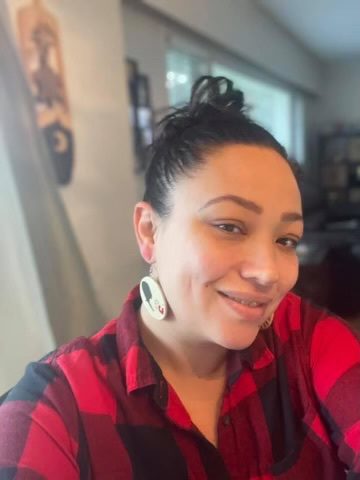
We’ve known for many years that the transition from youth to adulthood can be difficult, particularly for Indigenous youth in care. This can include higher levels of homelessness, involvement with the justice system, depression and even death. For years, many youth advocates, including the Representative for Children and Youth, have lobbied for more supports for youth aging out of care.
The newly created Post-Majority Team is a much needed and welcome addition to the Xyólheméylh family and made possible by new funding from the government to help youth transition from care when they turn 19.
The team is led by Terri Brunelle and is currently in the building phase, with new recruits coming on board soon. They will be a team of four people. Terri has been with Xyólheméylh for eight years as a Family Cultural Connections Worker and a Family Strengthening Team Lead for the permanency team and Circle Five. She is Anishinaabe from the Brunswick House First Nation in Ontario.
Terri is super excited about getting to create a program that is culturally grounded, supportive and that incorporates the feedback from the youth they’re working with. Supports can include everything from helping the youth with housing, training and post-secondary education, life skills, financial literacy, or building family connections. The goals are set by the youth, not by the social workers, and then an agreement is drawn up so they can move into independence.
“The biggest difference we’re seeing is it’s based on what the youth want. We’re stepping into a place of coming alongside them and seeing how we can best support them,” says Terri. She also sees it as an opportunity to undo some of the harm that may have been done and to address trauma they may have, and to support them as they continue to move into community and to create stability for them. “We look at community and cultural connections, helping them build support networks, helping them to achieve their goals and really looking at those core basic life skills,” says Terri.
The team is currently supporting over 120 youth who are living off-reserve. Some are still with their caregivers and others are living independently. Conversations are currently taking place on how this will work in the Stó:lō communities.
Xyólheméylh's christmas
Christmas is always a busy time of year at Xyólheméylh. We organized over 200 Christmas hampers for families and youth in the Fraser Valley. Thank you to our staff for making this happen. On Saturday, November 25 we held our annual Children in Care Christmas Party at Mamele'ewt Community Indigenous Centre in Abbotsford. The festivities included Christmas activities, food, a photo booth and a visit from Santa Claus. On December 14, the Visions and Voices Youth Advisory group organized an event called A Not So Silent Night for children ages 5 to 12 at Play Abby. Christmas card contest.
Youth Hub
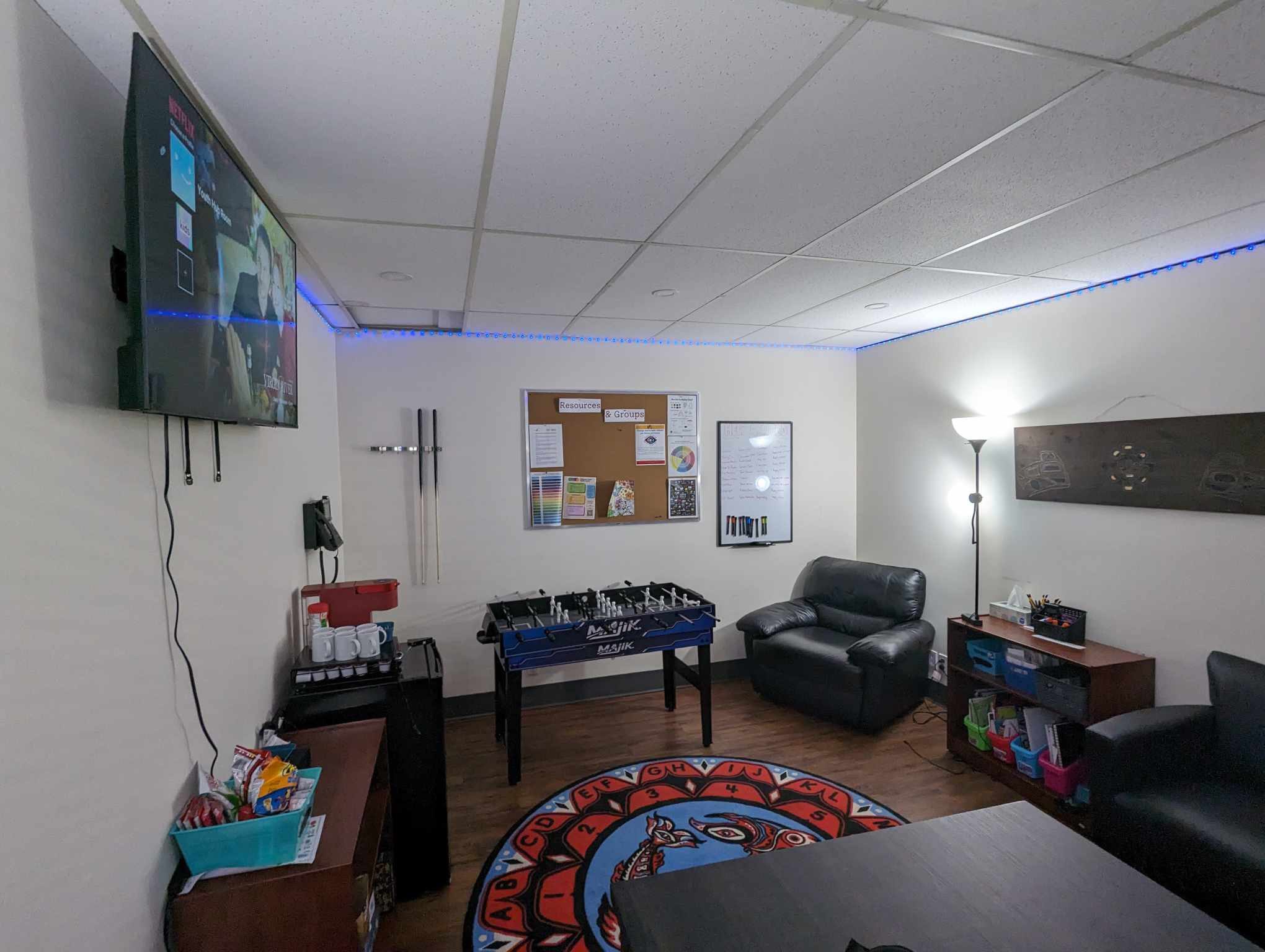
Xyólheméylh has opened a Youth Hub at our office in Chilliwack at 9345 Main Street. It's open to all Indigenous youth to drop in Tuesdays from 8:30 am to noon, and 1 to 4:30 pm and on Thursday afternoons from 1 to 4:30 pm. Youth can drop by to grab a snack or cook a meal, do laundry, charge their phones, have a shower, get support with job and school applications, and talk to a youth worker. There's also a 4-in-1 Games table with pool, air hockey, ping pong, foosball! There are crafts, cultural books, art supplies, homework supplies, drinks, snacks, coffee machine, gameboards, TV, Bluetooth speaker, etc!
There is a Resource board where youth will find upcoming groups or events, white board has some of the current local job opportunities.
Questions about youth programming and the youth hub can be directed to Raven Little at: [email protected].
visions and voices annual forum 2024
The Visions and Voices Annual Forum returned from November 17 - 19, 2023 after a hiatus for three years due to Covid. Over 40 youth participated in the event . Activities included drum making, carving, archery, climbing and a workshop with staff to provide feedback. On Saturday the highlight was a workshop with James Jones, also known as Notorious Cree. On Sunday, the youth met with the Representative for Children and Youth, Dr. Jennifer Charlesworth, to provide feedback on the child welfare system.
